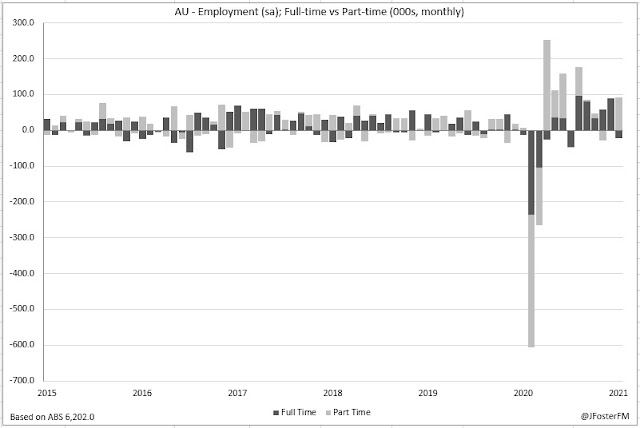Australia's labour force survey for April is due to be released by the ABS at 11:30am (AEST) today. This will be the first report since the expiry of the Federal Government's JobKeeper wage subsidy scheme that helped maintain jobs and incomes through the lockdowns, though this not expected to derail the recovery with employment already back at pre-pandemic levels and job vacancies and other forward-looking indicators of labour demand elevated.
As it stands | Labour Force SurveyEmployment strongly outperformed market expectations for a second consecutive month in March rising by a further 70.7k against 35k forecast. At a total of 13.077m, employment is around 0.6% above its pre-pandemic level.
The part-time segment accounted for all of March's employment gain with a 91.5k rise after several months of soft outcomes. Coming against the run of play, full-time employment fell by 20.8k to post its weakest outcome since September. Part-time employment was harder hit by the pandemic than the full-time segment, though its recovery has been stronger and has occurred more quickly.
Despite the national participation rate reaching a new record high in March after rising from 66.1% to 66.3%, the resulting 43.6k increase in the labour force was easily outpaced by employment (70.7k) in the month. This led to the unemployment rate falling from 5.8% to 5.6%, continuing the descent from its COVID peak of 7.5% but still above its pre-pandemic level of 5.2%. Broader rates of spare capacity also declined in the month with underutilisation -0.9ppt to 13.5% and underemployment -0.6ppt to 7.9%, with both measures now below pre-pandemic levels but still much higher than policymakers would like.
The easing of restrictions in Victoria and Western Australia after circuit-breaker lockdowns contributed to a robust 2.2% lift in hours worked in March. With the reopening broadening out and the economy rebounding strongly, hours worked in March stood 1.2% above their pre-pandemic level to be running ahead of employment in the recovery.
Market Expectations | Labour Force Survey
Employment is expected to slow in April, pointing towards the impact of the withdrawal of the JobKeeper wage subsidy, with the median estimate at 20.0k. The range for the outcome is wide, from -40.0k on the low side to 60.0k on the high side. National unemployment is forecast to remain unchanged at 5.6% (range: 5.4% to 5.8%), based on the participation remain holding at 66.3%.
Employment is expected to slow in April, pointing towards the impact of the withdrawal of the JobKeeper wage subsidy, with the median estimate at 20.0k. The range for the outcome is wide, from -40.0k on the low side to 60.0k on the high side. National unemployment is forecast to remain unchanged at 5.6% (range: 5.4% to 5.8%), based on the participation remain holding at 66.3%.
What to watch | Labour Force Survey
All the interest today will be around the headline employment number for the month. Given employment has averaged a little over 80.ok/mth over the last 6 months, a slowing is to be expected the longer the recovery goes on, but the consensus estimate of just 20.0k points to some caution around the expiry of JobKeeper. Clearly, there is a large degree of uncertainty here. Consider that in March the number of employed people working zero hours had fallen to 59.6k to be around the levels from before the onset of the pandemic, while in the ABS's high-frequency payrolls data, payroll jobs growth had declined of late, though seasonal effects around Easter holidays have contributed to this (see below). Today's report should provide the market with more clarity on the early stages of the transition that is underway, but it will likely take several months before definitive conclusions can be drawn of the effects of the JobKeeper withdrawal on the recovery.





